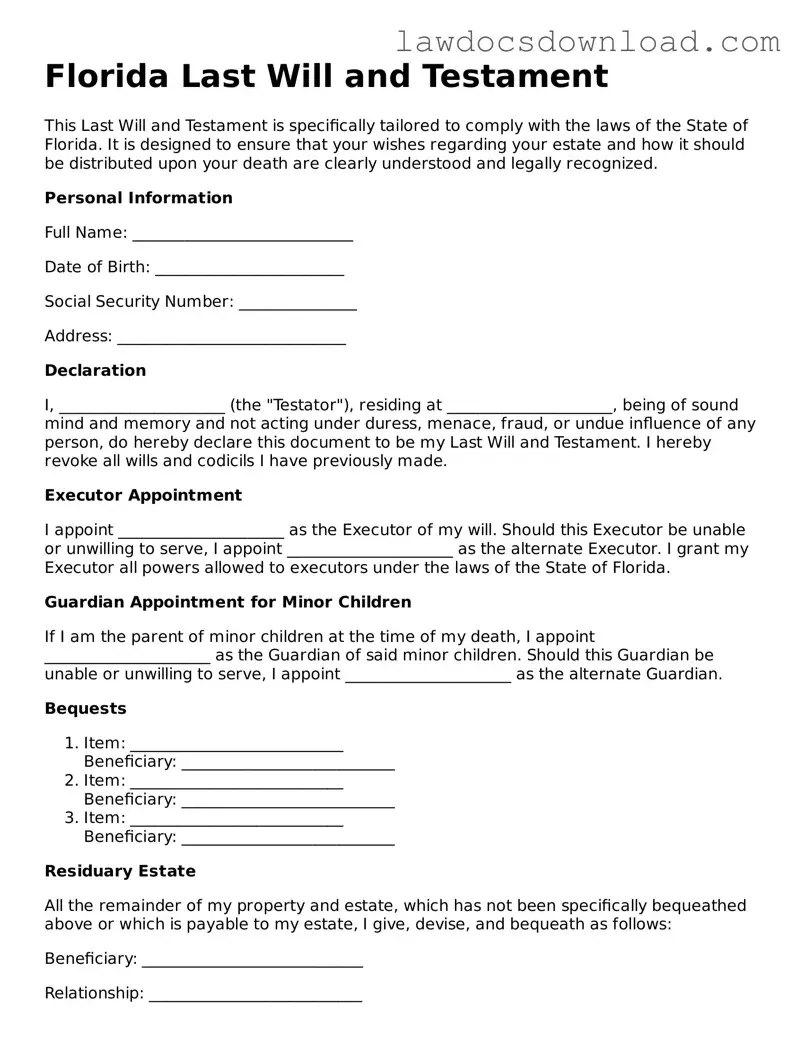Florida Last Will and Testament
This Last Will and Testament is specifically tailored to comply with the laws of the State of Florida. It is designed to ensure that your wishes regarding your estate and how it should be distributed upon your death are clearly understood and legally recognized.
Personal Information
Full Name: ____________________________
Date of Birth: ________________________
Social Security Number: _______________
Address: _____________________________
Declaration
I, _____________________ (the "Testator"), residing at _____________________, being of sound mind and memory and not acting under duress, menace, fraud, or undue influence of any person, do hereby declare this document to be my Last Will and Testament. I hereby revoke all wills and codicils I have previously made.
Executor Appointment
I appoint _____________________ as the Executor of my will. Should this Executor be unable or unwilling to serve, I appoint _____________________ as the alternate Executor. I grant my Executor all powers allowed to executors under the laws of the State of Florida.
Guardian Appointment for Minor Children
If I am the parent of minor children at the time of my death, I appoint _____________________ as the Guardian of said minor children. Should this Guardian be unable or unwilling to serve, I appoint _____________________ as the alternate Guardian.
Bequests
- Item: ___________________________
Beneficiary: ___________________________
- Item: ___________________________
Beneficiary: ___________________________
- Item: ___________________________
Beneficiary: ___________________________
Residuary Estate
All the remainder of my property and estate, which has not been specifically bequeathed above or which is payable to my estate, I give, devise, and bequeath as follows:
Beneficiary: ____________________________
Relationship: ___________________________
Percentage of Estate: ____________________
Signatures
This Last Will and Testament was signed and declared by the Testator, _____________________, as their Last Will and Testament, in our presence, who in their presence and in the presence of each other, have hereunto subscribed our names as witnesses on this ____ day of ____________, 20__.
- Testator's Signature: ___________________________
- Witness #1 Signature: ___________________________
- Name: ___________________________
- Address: ___________________________
- Witness #2 Signature: ___________________________
- Name: ___________________________
- Address: ___________________________
Declaration by Witnesses
We, the undersigned, declare that the Testator willingly signed and executed this document as their Last Will and Testament in our presence, that they signed it willingly, and that they appear to be of sound mind and under no duress, menace, fraud, or undue influence.
Note: This template is provided for general informational purposes only and may not reflect all legal requirements of the State of Florida. It is recommended to consult with a licensed attorney in the State of Florida to ensure that your Last Will and Testament complies with all state and local laws and requirements.

